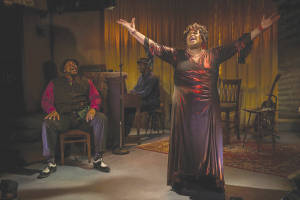By Eelisa Jones
 The Milwaukee Rep’s Stackner Caberet has chosen to show a feature musical theater piece, Low Down Dirty Blues, this year from March 20 to May 24.
The Milwaukee Rep’s Stackner Caberet has chosen to show a feature musical theater piece, Low Down Dirty Blues, this year from March 20 to May 24.
The revue alternates between a number of short sketches and a set list of songs which includes over two dozen blues compositions – ranging from Big Mama Thorton’s “They Call Me Big Momma” to Blind Willie Johnson’s “Nobody’s Fault but Mine.”
Low Down Dirty Blues takes place inside a typical Chicago-style blues bar that melds seamlessly into Stackner’s stylish cabaret theater.
The performance, however, is far from typical. From the rich soulfulness in the voices of Felicia P. Fields and Caron “Sugaray” Rayford to Chic Street Man’s silky smooth crooning and, finally, to Robert Stephens’ quick-handed piano solos, Low Down Dirty Blues produces a priceless array of musical expression and talent in the name of blues music throughout history.
The performance frequently incorporates audience participation and contains plenty of off-handed exchanges among the performers.
Numbers like Johnson’s “My Stove’s in Good Condition” and LaSalle’s “Don’t Jump My Pony” brazenly embrace the sexually-charged elements characteristic in early blues music.
In between pieces, Fields, Rayford, and Man perform short historical vignettes.
Each performer of Low Down Dirty Blues is on-point with her or his character – and clearly enjoying it.
Their enthusiasm is both contagious and dazzling.
The connection between the performers and audience members is nearly palpable, which is fortunate given the wide emotional spectrum of the performance’s pieces.
As myself and two others who shared my dinner table can confirm: it may be helpful to bring tissues for the second act.
According to musical lore, African-American musician W.C. Handy first identified the unique sounds of a certain strain of black southern music style as “blues” in one of his 1902 compositions.
As the story goes, he was resting at a train station in Tutwiler, Mississippi, Handy noticed a man singing about his travels and using a knife’s edge on his guitar to produce a distinct twang.
Handy documented this “Mississippi Delta Blues” style of music, but the tradition remained mostly grounded in oral history for nearly two decades.
It wasn’t until the 1920s – when Southern blacks migrated to Northern cities in search of work – that blues took a commercial hold and evolved into what most Americans are familiar with today.
One could easily claim, however, that the roots of blues music extend into West African and Caribbean soil.
Shaped by the spirituals and work songs of black American slaves, blues music encapsulates a kind of suffering familiar to the ancestors of many Americans today.
Low Down Dirty Blues features a type of blues music which Dan Wheetman, its co-writer and musical director, refers to as of the “spicier” variety.
Although the play incorporates a number UWM student and mother Chanel Edwards walks alongside her son of historical references, Wheetman insists that Low Down Dirty Blues is not a historical piece, but rather one that describes how the three main characters wind up in a Chicago blues bar.
“This is not so much a historic thing,” said Wheetman.
“It is a story about the people… these three people in this club and their stories, which includes the music but is more of a personal talk about what brought them where they are.”
Readers can learn more about the performance and venue by visiting http://www.milwaukeerep.com/ or calling The Milwaukee Rep’s ticket office at 414-224-9490.



